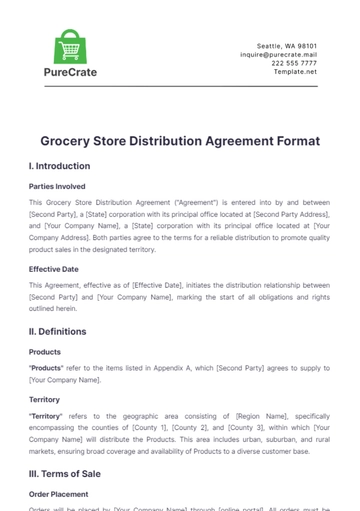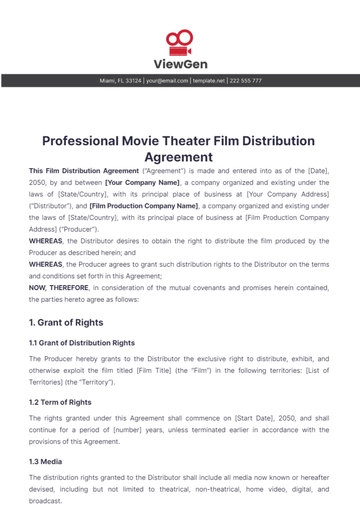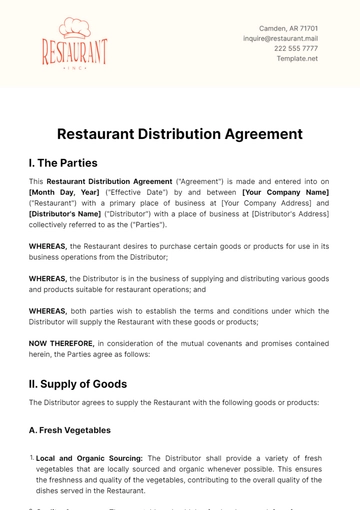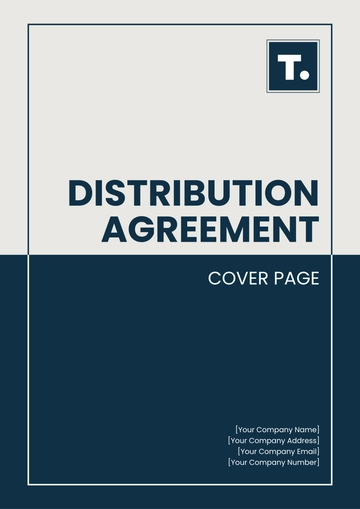Free Restaurant Distribution Agreement
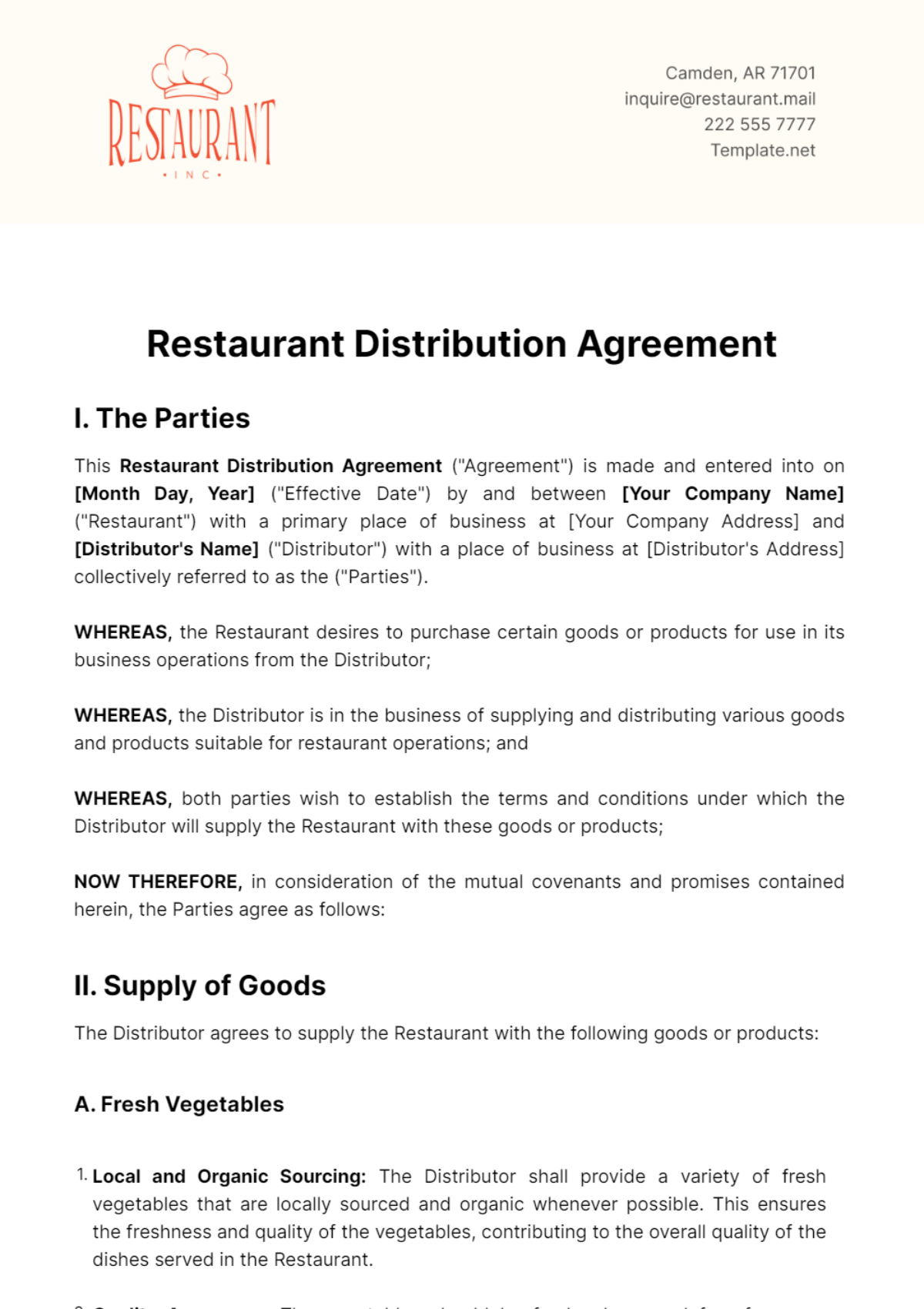
I. The Parties
This Restaurant Distribution Agreement ("Agreement") is made and entered into on [Month Day, Year] ("Effective Date") by and between [Your Company Name] ("Restaurant") with a primary place of business at [Your Company Address] and [Distributor's Name] ("Distributor") with a place of business at [Distributor's Address] collectively referred to as the ("Parties").
WHEREAS, the Restaurant desires to purchase certain goods or products for use in its business operations from the Distributor;
WHEREAS, the Distributor is in the business of supplying and distributing various goods and products suitable for restaurant operations; and
WHEREAS, both parties wish to establish the terms and conditions under which the Distributor will supply the Restaurant with these goods or products;
NOW THEREFORE, in consideration of the mutual covenants and promises contained herein, the Parties agree as follows:
II. Supply of Goods
The Distributor agrees to supply the Restaurant with the following goods or products:
A. Fresh Vegetables
Local and Organic Sourcing: The Distributor shall provide a variety of fresh vegetables that are locally sourced and organic whenever possible. This ensures the freshness and quality of the vegetables, contributing to the overall quality of the dishes served in the Restaurant.
Quality Assurance: The vegetables should be fresh, clean, and free from any visible defects or decay. The Distributor is responsible for conducting thorough quality checks before delivery to ensure that only the best produce reaches the Restaurant.
Proper Packaging and Transportation: The Distributor shall ensure that the vegetables are packed and transported under appropriate conditions to maintain their freshness and quality. This includes using refrigerated transport and proper packaging materials to prevent damage during transit.
B. Dairy Products
Range of Products: The Distributor shall supply a range of dairy products including but not limited to milk, cheese, yogurt, and butter. This allows the Restaurant to offer a diverse menu to its customers.
Quality and Safety Standards: All dairy products should be sourced from reputable suppliers and meet the highest standards of quality and safety. This ensures that the Restaurant can confidently serve these products to its customers.
Refrigerated Storage and Transport: The Distributor shall ensure that the dairy products are stored and transported under refrigerated conditions to maintain their freshness and prevent spoilage. This is crucial as dairy products are highly perishable and require careful handling.
C. Meats
Variety of Meats: The Distributor shall supply various types of meats including but not limited to beef, chicken, pork, and fish. This allows the Restaurant to cater to the diverse preferences of its customers.
Ethical and Sustainable Sourcing: All meats should be sourced from suppliers who adhere to ethical and sustainable farming practices. This is in line with the Restaurant’s commitment to responsible sourcing and sustainability.
Quality Assurance: The meats should be fresh, properly butchered, and free from any visible defects or decay. The Distributor is responsible for conducting thorough quality checks before delivery to ensure that only the best quality meats reach the Restaurant.
D. Beverages
Variety of Beverages: The Distributor shall supply a variety of beverages including but not limited to soft drinks, juices, and bottled water. This allows the Restaurant to offer a diverse beverage menu to its customers.
Quality and Safety Standards: All beverages should be sourced from reputable manufacturers and meet the highest standards of quality and safety. This ensures that the Restaurant can confidently serve these beverages to its customers.
Proper Storage and Transport: The Distributor shall ensure that the beverages are stored and transported under appropriate conditions to maintain their quality and prevent spoilage. This includes using refrigerated transport for perishable beverages and ensuring that all beverages are properly sealed to prevent contamination.
E. Baking Supplies
Range of Baking Supplies: The Distributor shall supply various baking supplies including but not limited to flour, sugar, baking powder, and yeast. This allows the Restaurant to create a wide range of baked goods for its customers.
Quality and Safety Standards: All baking supplies should be sourced from reputable manufacturers and meet the highest standards of quality and safety. This ensures that the Restaurant can confidently use these supplies in its baking operations.
Proper Storage and Transport: The Distributor shall ensure that the baking supplies are stored and transported under appropriate conditions to maintain their quality and prevent spoilage. This includes using sealed containers for transport and ensuring that all supplies are kept away from moisture and contaminants.
III. Pricing and Payment
A. Payment Terms
Payment Schedule: All payments shall be made by the Restaurant to the Distributor within [30] days of receipt of the invoice. This ensures that the Distributor receives timely payment for the goods supplied.
Payment Method: The Restaurant shall make payments via bank transfer or any other mutually agreed method. The Restaurant shall ensure that all payments are made in full without any deductions or withholdings unless required by law.
B. Invoice Disputes
Dispute Communication: Any disputes concerning invoices must be communicated in writing to the other party within [10] days of receipt. The Restaurant and the Distributor shall work together in good faith to resolve any invoice disputes promptly and amicably.
Dispute Resolution: If the dispute cannot be resolved within [30] days, the parties may seek resolution through the dispute resolution mechanism provided in this Agreement.
C. Late Payment Fee
Late Payment Charges: The Distributor reserves the right to charge a late payment fee of [1.5]% per month for any amounts remaining unpaid beyond the due date. The late payment fee shall be calculated on a daily basis from the due date until the date of actual payment.
Payment of Late Fees: The Restaurant shall be responsible for paying all late payment fees in addition to the outstanding invoice amount.
D. Billing
Billing Details: The Distributor agrees to provide an itemized bill for each delivery clearly indicating quantities, descriptions, and unit prices of the goods supplied. The Distributor shall send the bill to the Restaurant via email or any other mutually agreed method within [5] days of delivery.
Bill Review: The Restaurant shall review the bill and notify the Distributor of any discrepancies within [10] days of receipt. If no discrepancies are reported within this period, the bill shall be deemed accurate and payable.
IV. Term and Termination
A. Agreement Duration
Commencement: This Agreement shall commence on the Effective Date and continue for a period of [1] year (the “Initial Term”), unless terminated earlier in accordance with this Agreement.
Extension: After the Initial Term, the Agreement may be extended by mutual agreement of the Parties. This allows for continuity of service if both parties are satisfied with the arrangement.
Review: The Parties may review the terms of the Agreement at the end of the Initial Term or any subsequent term and make any necessary adjustments.
B. Termination Notice
Notice Period: Either party may terminate this Agreement, with or without cause, by providing [30] days written notice to the other party. This gives both parties sufficient time to make alternative arrangements.
Method of Notice: The notice of termination should be delivered in writing and may be sent via email, registered mail, or hand delivery. This ensures that the notice is properly documented.
Receipt of Notice: The notice period begins from the date the notice is received by the other party. This ensures that both parties have a clear understanding of the timeline for termination.
C. Obligations upon Termination
Payment for Goods Delivered: In the event of termination, the Restaurant shall pay for all goods delivered up to the date of termination. This ensures that the Distributor is compensated for all goods supplied.
Confidentiality and Indemnification: The obligations and responsibilities of the parties with respect to confidentiality and indemnification shall survive the termination of this Agreement. This protects the interests of both parties after the termination of the Agreement.
Delivery of Remaining Goods: Upon termination, the Distributor shall promptly deliver all remaining goods requested by the Restaurant unless otherwise directed by the Restaurant. This ensures that the Restaurant has sufficient supplies to continue its operations during the transition period.
V. Confidentiality
A. Confidential Information
Definition: Both parties agree to regard and preserve as confidential all materials and information, whether written or oral, provided by the other party that is designated confidential. This includes business plans, customer lists, recipes, pricing information, and any other proprietary information.
Protection: Neither party shall disclose, directly or indirectly, the confidential information of the other party to any third party except as required for the performance of its duties under this Agreement. This ensures that the confidential information is protected from unauthorized disclosure.
Exceptions: Information that is publicly available, already known to the receiving party, or lawfully obtained from another source is not considered confidential. This provides a reasonable balance between the need to protect confidential information and the need to conduct business effectively.
B. Duration of Confidentiality Obligation
Term: This confidentiality obligation extends for [3] years beyond the termination or expiration of this Agreement. This ensures that the confidential information is protected for a reasonable period after the end of the Agreement.
Review: The Parties may review and adjust the duration of the confidentiality obligation as necessary, taking into account the nature of the confidential information and the business needs of both parties.
Survival: The confidentiality obligation survives the termination or expiration of this Agreement. This ensures that the confidential information remains protected even after the Agreement ends.
C. Measures to Ensure Confidentiality
Security Measures: The parties shall take all reasonable measures to ensure the confidentiality of such information. This includes using secure storage and transmission methods and limiting access to the confidential information.
Employee Training: The parties shall train their employees and contractors about the importance of confidentiality and the measures required to protect the confidential information.
Breach of Confidentiality: In the event of a breach of confidentiality, the party responsible for the breach shall promptly notify the other party and take immediate steps to remedy the breach.
VI. Indemnification
A. Indemnity Obligations
Mutual Indemnity: Each party shall indemnify, defend, and hold harmless the other party from any claims, damages, liabilities, costs, and expenses, including reasonable attorneys’ fees, arising out of or related to any breach of this Agreement, negligence, or willful misconduct by the indemnifying party.
Scope of Indemnity: The indemnity covers all losses, damages, liabilities, settlements, judgments, costs, and expenses, including reasonable attorneys’ fees and other legal expenses. This provides comprehensive protection to both parties.
Exclusions: The indemnity does not cover any losses or damages resulting from the indemnified party’s own negligence, willful misconduct, or breach of this Agreement. This ensures that each party is responsible for its own actions.
B. Indemnity Procedures
Notice of Claim: The indemnified party shall promptly notify the indemnifying party of any claim and cooperate fully in the defense or settlement of any such claim.
Control of Defense: The indemnifying party shall have control of the defense and all related settlement negotiations. This allows the indemnifying party to manage the claim in a manner that best protects its interests.
Participation in Defense: The indemnified party may participate in the defense at its own expense. This allows the indemnified party to protect its own interests in the claim.
C. Survival of Indemnity
Survival of Obligations: This indemnification obligation shall survive the expiration or termination of this Agreement. This ensures that the parties remain protected from any claims that arise after the Agreement ends.
Limitation Period: The indemnification obligations shall continue for a period of [3] years after the termination or expiration of this Agreement. This provides a reasonable time frame for any claims to be brought and resolved.
Review of Survival Period: The Parties may review and adjust the survival period as necessary, taking into account the nature of the goods supplied and the potential for any claims to arise.
VII. Dispute Resolution
A. Negotiation
Good Faith Negotiations: In the event of any dispute arising out of or related to this Agreement, the parties agree to first attempt to resolve the dispute through good faith negotiations.
Time for Negotiation: The parties shall endeavor to resolve the dispute through negotiations within [30] days. This provides a reasonable time frame for the parties to discuss the issue and find a resolution.
Escalation: If the dispute cannot be resolved through negotiations, the parties may escalate the dispute to their respective senior management.
B. Mediation
Submission to Mediation: If the dispute cannot be resolved through negotiations within [30] days, the parties agree to submit the dispute to mediation conducted by a mediator jointly selected by the parties.
Mediation Process: The mediation shall be conducted in accordance with the mediation rules agreed upon by the parties.
Costs of Mediation: The costs of the mediation shall be shared equally by the parties unless otherwise agreed. This ensures that both parties have a stake in the process and are motivated to resolve the dispute.
C. Litigation
Right to Litigate: If the dispute is not resolved through mediation, either party may pursue litigation in a court of competent jurisdiction.
Prevailing Party: The prevailing party in any litigation shall be entitled to recover its reasonable attorneys’ fees and costs from the other party.
Jurisdiction and Venue: The parties agree that any litigation arising out of this Agreement shall be filed in a court of competent jurisdiction in the [State Name].
VIII. Signatures
IN WITNESS WHEREOF, the Parties hereto have executed this Agreement as of the Effective Date.
Restaurant

[Authorized Representative Name]
[Your Company Name]
Date: [Month Day, Year]
Distributor

[Authorized Representative Name]
[Distributor's Name]
Date: [Month Day, Year]
- 100% Customizable, free editor
- Access 1 Million+ Templates, photo’s & graphics
- Download or share as a template
- Click and replace photos, graphics, text, backgrounds
- Resize, crop, AI write & more
- Access advanced editor
Simplify distribution agreements with the Restaurant Distribution Agreement Template from Template.net! This editable template ensures all essential details are included, providing a comprehensive agreement that protects your interests. It is highly customizable and with the help of the AI Editor Tool, you can easily draft a professional and precise document!
You may also like
- Lease Agreement
- Non Compete Agreement
- Rental Agreement
- Prenuptial Agreement
- Non Disclosure Agreement
- Operating Agreement
- Hold Harmless Agreement
- LLC Operating Agreement
- Arbitration Agreement
- Purchase Agreement
- Residential Lease Agreement
- Executive Agreement
- Confidentiality Agreement
- Contractor Agreement
- Partnership Agreement
- Postnuptial Agreement
- Collective Bargaining Agreement
- Loan Agreement
- Roommate Agreement
- Commercial Lease Agreement
- Separation Agreement
- Cohabitation Agreement
- Room Rental Agreement
- Child Custody Agreement
- Employee Agreement
- License Agreements
- Settlement Agreement
- Joint Venture Agreement
- Indemnity Agreement
- Subordination Agreement
- Sales Agreement
- Agreements Between Two Parties
- Business Agreement
- Real Estate Agreement
- HR Agreement
- Service Agreement
- Property Agreement
- Agreement Letter
- Restaurant Agreement
- Construction Agreement
- Finance Agreement
- Marketing Agreement
- Payment Agreement
- Investment Agreement
- Management Agreement
- Nonprofit Agreement
- Software Agreement
- Startup Agreement
- Agency Agreement
- Copyright Agreement
- Collaboration Agreement
- Reseller Agreement
- Car Rental Agreement
- Cleaning Services Agreement
- Consultant Agreement
- Deed Agreement
- Car Agreement
- Equipment Agreement
- Shares Agreement
- Data Sharing Agreement
- Advertising Agreement
- School Agreement
- Franchise Agreement
- Event Agreement
- Travel Agency Agreement
- Vehicle Agreement
- Board Resolution Agreement
- Land Agreement
- Binding Agreement
- Tenancy Agreement
- Exclusive Agreement
- Development Agreement
- Assignment Agreement
- Design Agreement
- Equity Agreement
- Mortgage Agreement
- Purchase and Sale Agreement
- Shareholder Agreement
- Vendor Agreement
- Royalty Agreement
- Vehicle Lease Agreement
- Hotel Agreement
- Tenant Agreement
- Artist Agreement
- Commission Agreement
- Consignment Agreement
- Debt Agreement
- Recruitment Agreement
- Training Agreement
- Transfer Agreement
- Apprenticeship Agreement
- IT and Software Agreement
- Referral Agreement
- Resolution Agreement
- Waiver Agreement
- Consent Agreement
- Partner Agreement
- Social Media Agreement
- Customer Agreement
- Credit Agreement
- Supply Agreement
- Agent Agreement
- Brand Agreement
- Law Firm Agreement
- Maintenance Agreement
- Mutual Agreement
- Retail Agreement
- Deposit Agreement
- Land Purchase Agreement
- Nursing Home Agreement
- Supplier Agreement
- Buy Sell Agreement
- Child Support Agreement
- Landlord Agreement
- Payment Plan Agreement
- Release Agreement
- Research Agreement
- Sponsorship Agreement
- Buyout Agreement
- Equipment Rental Agreement
- Farm Agreement
- Manufacturing Agreement
- Strategic Agreement
- Termination of Lease Agreement
- Compliance Agreement
- Family Agreement
- Interior Design Agreement
- Ownership Agreement
- Residential Lease Agreement
- Retainer Agreement
- Trade Agreement
- University Agreement
- Broker Agreement
- Dissolution Agreement
- Funding Agreement
- Hosting Agreement
- Investor Agreement
- Memorandum of Agreement
- Advisory Agreement
- Affiliate Agreement
- Freelancer Agreement
- Grant Agreement
- Master Service Agreement
- Parking Agreement
- Subscription Agreement
- Trust Agreement
- Cancellation Agreement
- Horse Agreement
- Influencer Agreement
- Membership Agreement
- Vacation Rental Agreement
- Wholesale Agreement
- Author Agreement
- Distributor Agreement
- Exchange Agreement
- Food Agreement
- Guarantee Agreement
- Installment Agreement
- Internship Agreement
- Music Agreement
- Severance Agreement
- Software Development Agreement
- Storage Agreement
- Facility Agreement
- Intercompany Agreement
- Lending Agreement
- Lodger Agreement
- Outsourcing Services Agreement
- Usage Agreement
- Assurance Agreement
- Photography Agreement
- Profit Sharing Agreement
- Relationship Agreement
- Rent To Own Agreement
- Repayment Agreement
- Volunteer Agreement
- Co Parenting Agreement
- HVAC Agreement
- Lawn Care Agreement
- SAAS Agreement
- Work from Home Agreement
- Coaching Agreement
- Protection Agreement
- Security Agreement
- Repair Agreement
- Agreements License
